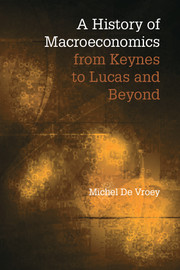Crossref Citations
This Book has been
cited by the following publications. This list is generated based on data provided by Crossref.
Goutsmedt, Aurrlien
Pinzzn-Fuchs, Erich
Renault, Matthieu
and
Sergi, Francesco
2015.
Criticizing the Lucas Critique: Macroeconometricians' Response to Robert Lucas.
SSRN Electronic Journal ,
Backhouse, Roger
and
Cherrier, Beatrice
2016.
The Age of the Applied Economist: The Transformation of Economics Since the 1970s.
SSRN Electronic Journal,
De Vroey, Michel
2016.
A Review of James Forder, Macroeconomics and the Phillips Curve Myth.
SSRN Electronic Journal ,
Galbbcs, Peter
2016.
Reassessing Contemporary Macroeconomics on Methodological Grounds A Weberian Approach.
SSRN Electronic Journal,
Galbbcs, Peter
2016.
'Very Deep Is the Well of the Past' -- A Review of M. De Vroey's 'A History of Macroeconomics from Keynes to Lucas and Beyond'.
SSRN Electronic Journal ,
Brady, Michael Emmett
2017.
R. Lucas's Research Program: Far Too Narrow with Too Many Special Assumptions.
SSRN Electronic Journal ,
Düppe, Till
2017.
How modern economics learned French: Jacques Drèze and the foundation of CORE.
The European Journal of the History of Economic Thought,
Vol. 24,
Issue. 2,
p.
238.
Brady, Michael Emmett
2017.
An Analysis of Joan Robinson's Virulent Attacks on J. M. Keynes, the General Theory and the IS-LP(LM) Model: On the Need for Historians of Economic Thought to Remove Joan Robinson's Myths About Keynes from the Literature on Macroeconomics.
SSRN Electronic Journal ,
Brady, Michael Emmett
2017.
How Kahn and the Robinsons Knew for Certain by August 1937, that Keynes's Theory of Interest Rate Determination Combined Liquidity Preference with the Incomplete Neoclassical Theory in Keynes's IS-LP(LM) Model in the General Theory.
SSRN Electronic Journal ,
Galbács, Péter
2017.
Max Weber és a modern makroökonómia újraértelmezése. Elméleti keret a kortárs makroökonómia módszertani elemzéséhez.
Közgazdasági Szemle,
Vol. 64,
Issue. 3,
p.
285.
Halsmayer, Verena
2017.
A Model to “Make Decisions and Take Actions”.
History of Political Economy,
Vol. 49,
Issue. Supplement,
p.
158.
De Vroey, Michel
2017.
Macroeconomics and the Phillips Curve Myth by James Forder.
History of Political Economy,
Vol. 49,
Issue. 4,
p.
722.
Halsmayer, Verena
2017.
A Model To Make Decisions and Take Actionss.
SSRN Electronic Journal,
Goutsmedt, Aurrlien
Pinzzn-Fuchs, Erich
Renault, Matthieu
and
Sergi, Francesco
2017.
Reacting to the Lucas Critique: The Keynesians' Pragmatic Replies.
SSRN Electronic Journal,
Brady, Michael Emmett
2017.
Liquidity Preference is the Second (Missing) Factor in Keynes's Chapter 13 'The General Theory of the Rate of Interest'. The First Factor Was the MEC Schedule for Investment Combined with Consumption Out of Income, Which Determined Savings.
SSRN Electronic Journal ,
Galbbcs, Peter
2017.
Some Methodological Aspects of the Controversy between Mainstream Economics and Institutionalism.
SSRN Electronic Journal,
Danthine, Samuel
and
De Vroey, Michel
2017.
THE INTEGRATION OF SEARCH IN MACROECONOMICS: TWO ALTERNATIVE PATHS.
Journal of the History of Economic Thought,
Vol. 39,
Issue. 4,
p.
523.
Brady, Michael Emmett
2017.
A Study of Some of the Most Severe Misrepresentations of J.M. Keynes's Theory of the Rate of Interest in the General Theory in the Late 1930's.
SSRN Electronic Journal ,
Csaba, László
2018.
Az intézményi gazdaságtan és a főáram.
Közgazdasági Szemle,
Vol. 65,
Issue. 01,
p.
1.
Forder, James
and
Sømme, Kardin
2018.
Explaining the Fame of Friedman's Presidential Address.
SSRN Electronic Journal ,





